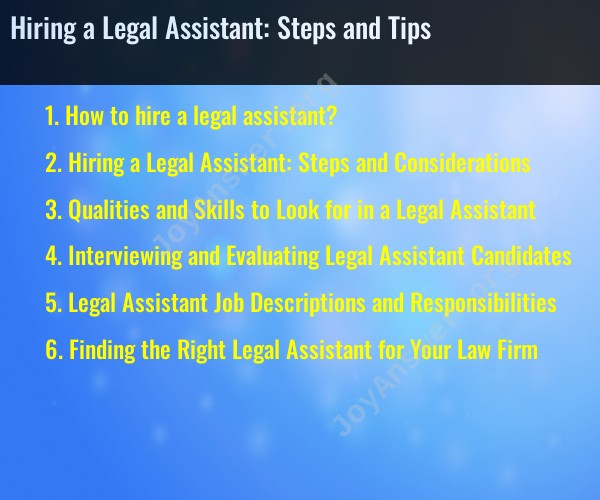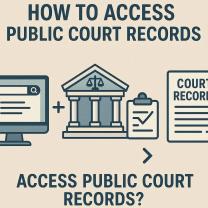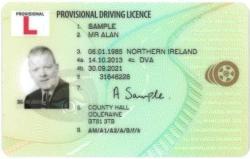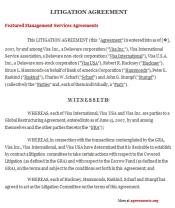How to hire a legal assistant?
Hiring a legal assistant is an important step for law firms and legal departments to ensure smooth operations and support lawyers in their work. Here are the steps and tips for hiring a legal assistant:
Steps:
Identify Your Needs:
- Determine the specific responsibilities and tasks you need the legal assistant to handle. This could include administrative tasks, legal research, document preparation, client communication, and more.
Create a Job Description:
- Write a clear and comprehensive job description that outlines the role, responsibilities, qualifications, and expectations for the legal assistant position.
Recruitment Strategy:
- Decide how you will conduct the hiring process. This may involve using job boards, legal industry websites, social media, or working with a recruitment agency.
Screen Resumes:
- Review resumes and applications to shortlist candidates who meet the job requirements and have the necessary qualifications and experience.
Interview Candidates:
- Conduct interviews to assess candidates' skills, knowledge, and suitability for the position. Consider both technical/legal skills and interpersonal skills.
Check References:
- Contact the provided references to verify the candidate's work history, skills, and character. This step is crucial for ensuring the candidate's credibility.
Assess Legal Knowledge:
- If the role involves legal tasks, consider assessing the candidate's legal knowledge, research skills, and familiarity with relevant software and databases.
Evaluate Soft Skills:
- Pay attention to soft skills such as communication, organization, attention to detail, and time management, as these are critical for success in the role.
Discuss Compensation:
- Negotiate and agree upon compensation, benefits, and work terms with the selected candidate. Be sure to comply with legal and labor regulations.
Offer Letter:
- Once you've selected a candidate, provide a formal offer letter outlining the terms of employment, including salary, benefits, start date, and any conditions.
Training and Orientation:
- Develop an orientation program to introduce the legal assistant to your firm's procedures, policies, and software tools.
Tips:
Clarify Job Expectations: Clearly communicate the duties and responsibilities of the legal assistant, so there is no ambiguity about what is expected.
Legal Qualifications: Depending on your needs, consider candidates with paralegal or legal assistant certifications or degrees.
Experience Matters: Prior experience in a law firm or legal department is often a valuable asset, as it can reduce the learning curve.
Legal Software Proficiency: Assess the candidate's proficiency in using legal software and tools commonly used in your practice area.
Adaptability: Look for candidates who are adaptable and can handle multiple tasks, as the role of a legal assistant can be diverse.
References: Don't skip reference checks. They can provide insights into a candidate's work ethic, reliability, and character.
Cultural Fit: Assess how well the candidate will fit into your firm's work culture and interact with other team members.
Continuing Education: Consider candidates who show a commitment to ongoing legal education and professional development.
Confidentiality: Legal assistants often deal with sensitive information, so ensure that candidates understand and respect client confidentiality.
Trial Period: Consider implementing a trial or probationary period to evaluate the candidate's performance before making a long-term commitment.
Hiring a legal assistant who meets your specific needs and can contribute to the efficiency of your legal practice is essential. By following these steps and considering these tips, you can find a qualified candidate who aligns with your firm's goals and values.
Hiring a Legal Assistant: Steps and Considerations
Hiring a competent and experienced legal assistant is crucial for law firms to maintain efficiency, organization, and productivity. The process of hiring a legal assistant involves several steps and considerations to ensure a successful outcome:
Identify Hiring Needs: Clearly define the specific duties and responsibilities required for the legal assistant position. Consider the firm's practice areas, workload, and the legal assistant's role in supporting attorneys and clients.
Develop a Job Description: Create a detailed job description outlining the position's responsibilities, required qualifications, and desired skills. This will help attract suitable candidates and set expectations for the role.
Advertise the Open Position: Utilize various channels to reach qualified candidates, such as online job boards, legal publications, professional networks, and referrals from within the legal community.
Review Resumes and Cover Letters: Carefully review resumes and cover letters to assess candidates' education, work experience, skills, and suitability for the position. Shortlist candidates who demonstrate the qualifications and experience required.
Conduct Interviews: Schedule interviews with shortlisted candidates to evaluate their personality, communication skills, problem-solving abilities, and fit within the firm's culture. Ask questions that gauge their knowledge of legal procedures, experience with relevant software, and ability to handle confidential information.
Verify References: Contact references provided by candidates to verify their employment history, work performance, and professional conduct. This can provide valuable insights into the candidate's work ethic, reliability, and ability to collaborate effectively.
Make an Offer: Select the most qualified candidate and extend a formal job offer, including salary, benefits, and start date. Clearly outline the terms of employment and ensure the candidate agrees to the conditions.
Onboard and Train the New Legal Assistant: Provide a thorough onboarding process to familiarize the new legal assistant with the firm's policies, procedures, and software systems. Offer ongoing training and support to ensure they are well-equipped to fulfill their duties effectively.
Qualities and Skills to Look for in a Legal Assistant
A successful legal assistant possesses a combination of essential qualities and skills that contribute to their effectiveness in supporting attorneys and clients:
Organizational Skills: The ability to manage and prioritize tasks, maintain accurate records, and ensure deadlines are met.
Communication Skills: Strong written and verbal communication skills to effectively communicate with attorneys, clients, and other professionals.
Attention to Detail: A keen eye for detail to ensure accuracy in drafting legal documents, preparing correspondence, and handling confidential information.
Legal Knowledge: Familiarity with legal terminology, procedures, and processes relevant to the firm's practice areas.
Technology Skills: Proficiency in using legal software, word processing programs, and other relevant technology tools.
Problem-solving Skills: The ability to identify and resolve issues effectively, demonstrating initiative and sound judgment.
Interpersonal Skills: Excellent interpersonal skills to maintain positive relationships with attorneys, clients, and colleagues, fostering a collaborative and supportive work environment.
Interviewing and Evaluating Legal Assistant Candidates
During the interview process, carefully evaluate candidates based on their qualifications, skills, and personality:
Assess their organizational skills: Ask questions about their experience in managing tasks, maintaining calendars, and prioritizing multiple projects.
Evaluate their communication skills: Engage in conversations to assess their ability to articulate ideas clearly, both in writing and verbally.
Gauge their attention to detail: Provide examples of legal documents or tasks that require accuracy and ask how they would approach them.
Assess their legal knowledge: Discuss relevant legal concepts, procedures, and software to determine their understanding of the firm's practice areas.
Evaluate their problem-solving skills: Present hypothetical scenarios and ask how they would identify and address the issues involved.
Assess their interpersonal skills: Observe their demeanor, interactions, and ability to connect with others.
Legal Assistant Job Descriptions and Responsibilities
The specific duties and responsibilities of a legal assistant vary depending on the firm's size, practice areas, and individual needs. However, common responsibilities include:
Drafting legal documents: Preparing pleadings, motions, contracts, and other legal documents under the supervision of attorneys.
Conducting legal research: Researching legal precedents, statutes, and regulations to support attorneys' cases.
Managing calendars and schedules: Scheduling appointments, meetings, and court appearances for attorneys.
Handling attorney correspondence: Preparing and sending correspondence to clients, opposing counsel, and other parties involved in legal matters.
Maintaining client files: Organizing and maintaining client files, ensuring confidentiality and accessibility of legal documents.
Providing administrative support: Ordering supplies, arranging travel, and providing general administrative assistance to attorneys.
Finding the Right Legal Assistant for Your Law Firm
To find the right legal assistant for











